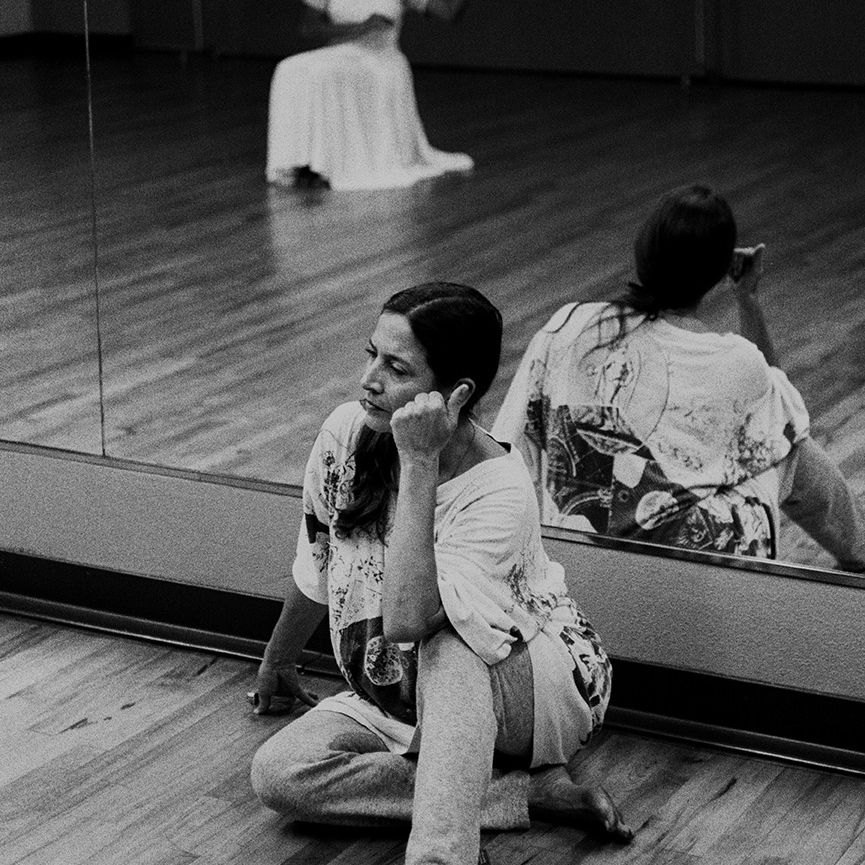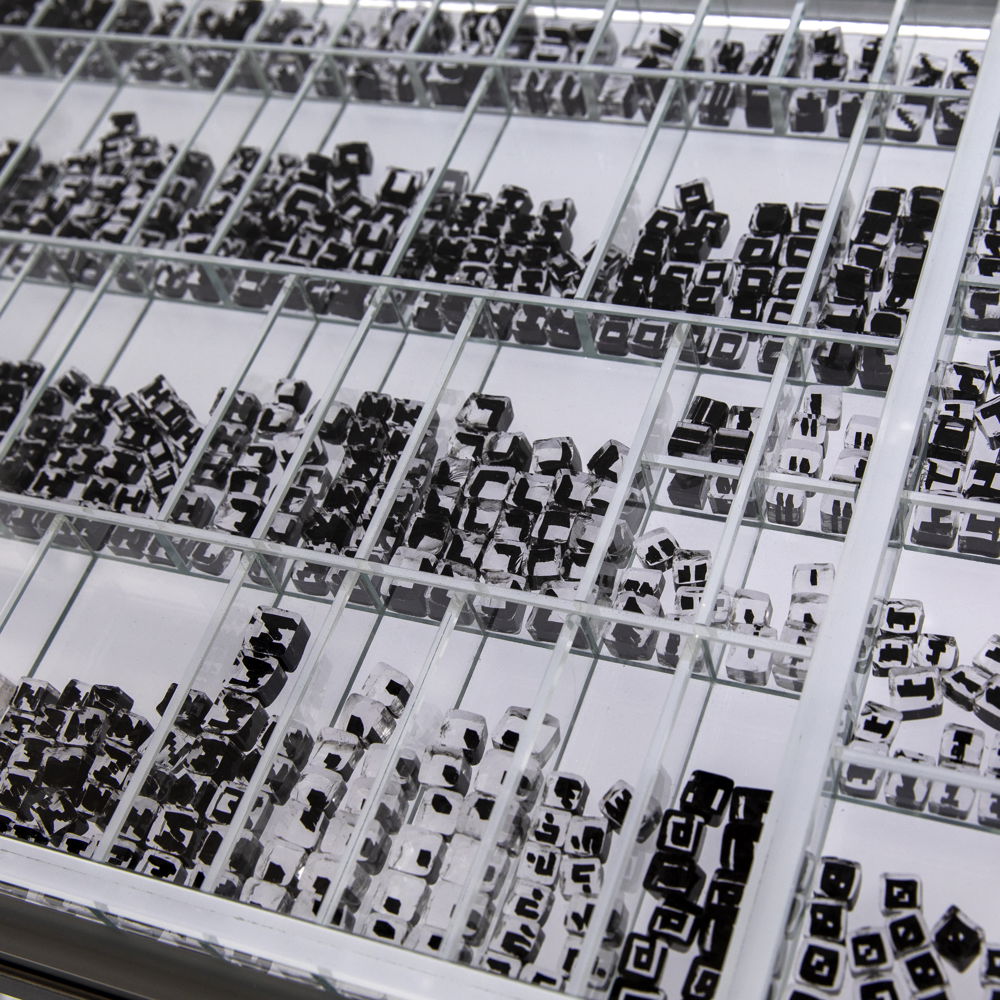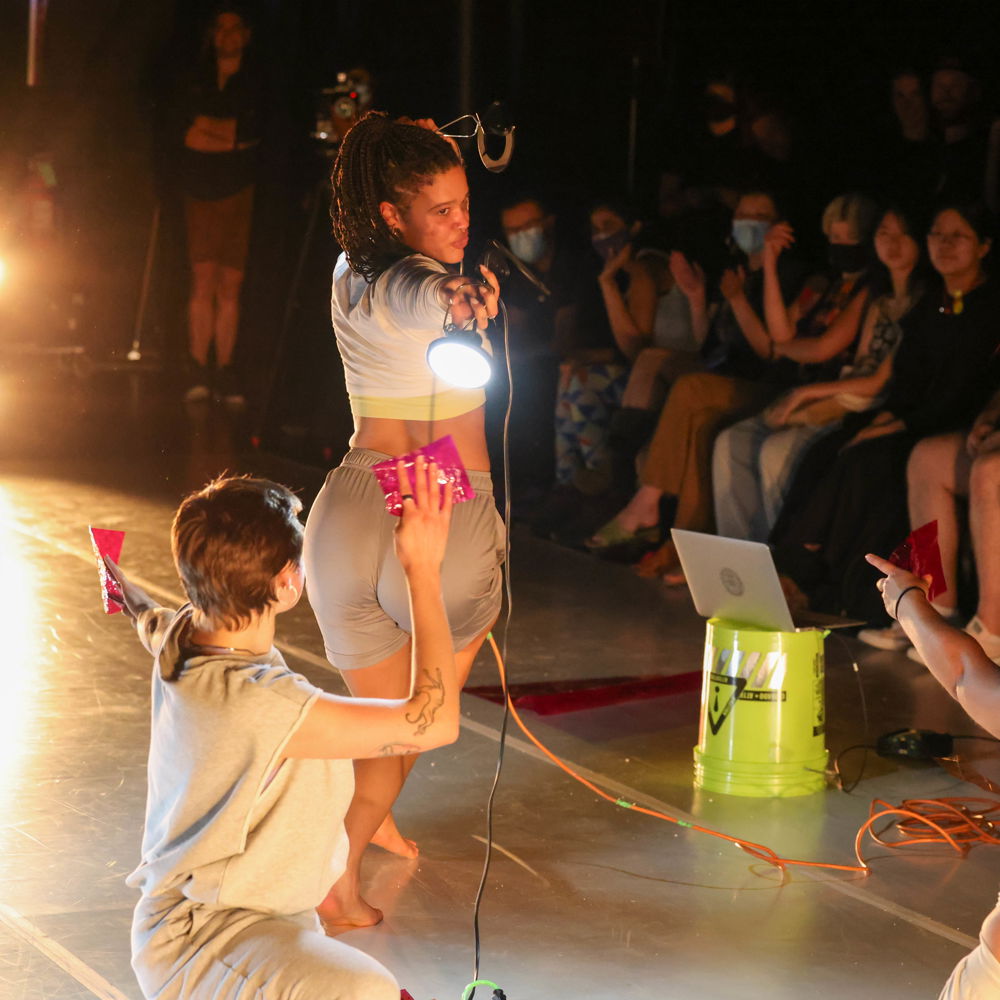I Am Because You Are: PJ Raval on Kapwa in Filmmaking
PJ Raval discusses his approach to filmmaking and embracing vulnerability

PJ Raval speaking at the Frameline San Francisco International LGBTQ+ Film Festival.
Courtesy of the artist.
PJ Raval is a queer, first-generation Filipinx-American filmmaker whose work examines social justice issues through the voices of queer and marginalized subjects. PJ is renowned for his impactful and evocative films, including Trinidad (2008), Before You Know It (2013), Call Her Ganda (2018), which delve into the intricacies of identity, sexuality, and cultural heritage. His most recent film, Who We Become, is a coming-of-age documentary following the lives of three young Filipino-American women in Texas during the COVID-19 pandemic. It also unpacks kapwa, a core Filipino value, through its three protagonists’ commitment to their families and their developing political consciousness.
Through his powerful storytelling, PJ has established himself as a vital voice in contemporary cinema, advocating for representation and equality through his thought-provoking films. In the following interview, we sat down with PJ to discuss his path to becoming an artist, how he approaches filmmaking, and the importance of embracing vulnerability.
Jessica Ferrer: You didn’t have early intentions of being a filmmaker, and yet here you are, and how lucky are we! How did you come to be an artist?
PJ Raval: I never had any intention of becoming a filmmaker and I think a lot of it was because I didn’t even know that I could be a filmmaker. Growing up I definitely loved art and anything creative; unfortunately, it was not encouraged.
Upon entering the university I declared myself a double major in visual art and biology with an emphasis in molecular biology and human genetics. And despite what people might think, I actually finished my science degree and worked as a lab researcher for a short period of time. I explored what it meant to be a scientist working in research for a short time.
What I came to realize was, although I was interested in the sciences, I didn’t want to pursue it professionally. Looking back, I think having a science background has been foundational for me because so much of science is based on process and method. As an artist and filmmaker, I’m always thinking about process.
Jessica: Who have been important teachers or influences for you on this path? What have you learned from them?
PJ: I’ve had a lot of different people influence or mentor me. I went to school at the University of California-San Diego in the mid-90s. At the time, the UCSD Visual Arts department had an amazing faculty of different artists who were working in film and media, very conceptually grounded, and really pushing the boundaries.
The first video class I took was with Thomas Allen Harris. To be taught by a queer, Black filmmaker and artist was greatly influential considering that I had come from a very small, conservative, white town in central California. To have someone like Thomas as my professor was huge. Thomas pushed us to not be precious about our work, to explore our ideas, and make a lot. We made a film or video every one to two weeks, so there wasn’t time to agonize over it. It was about exercising that creative muscle of doing, making, working instinctively, and being bold. Thomas is a beautiful example of someone using creativity and art to express themselves in all aspects.
Around the same time, I had taken all the photography classes I could, so I signed up for Intro to Filmmaking with Babette Mangolte. In the class we were tasked with creating a short film shot on 16mm black and white film stock. Everything in that class went completely wrong for me. I had a hard time loading the camera, things were exposed incorrectly, and I thought filmmaking wasn’t for me, but I remember Babette saying to me that she really wanted me to take the next class with her. I ended up taking the class and that was when I started falling in love with filmmaking. Babette saw something that I couldn’t even see in myself at the time.
I also want to give a shoutout to others who years later influenced me while I attended the University of Texas at Austin to get an MFA in Filmmaking: Athena Rachel Tsangari taught me directing, Cauleen Smith expanded my ideas of storytelling, and Mitko Panov also helped me hone my craft as a filmmaker.
There have been a lot of amazing teachers in my life, and the experience of emerging as an artist and filmmaker parallels my experience of emerging as a queer person of color. It all goes hand in hand. Not only were they teaching me filmmaking, but also encouraging me to make the kind of films I wanted to make, to tell the kinds of stories I felt compelled to tell, and to give myself the permission to explore these ideas.

PJ behind the scenes by Unraval Pictures.
“There have been a lot of amazing teachers in my life, and the experience of emerging as an artist and filmmaker parallels my experience of emerging as a queer person of color. It all goes hand in hand.”
Jessica: Your most recent film, Who We Become, unpacks kapwa, a core Filipino value, through its three protagonists’ commitment to their families and their developing political consciousness. How do you bring kapwa into your approach as a filmmaker and collaborator?
PJ: The concept of kapwa really is this idea of community, and part of why I love filmmaking is because it is so highly collaborative. I get the opportunity to work with some of my closest friends and colleagues. I love that collective experience.
Incorporating kapwa happens in a number of ways. First, thinking about what kind of stories I’m choosing to focus on and who I am in relation to those stories. Part of my community role is being a storyteller, making films that can share some of our stories with the rest of the world.
The second aspect is thinking about who is going to join me in making these films. What other kinds of stories can I be part of? A lot of that extends to a certain amount of solidarity and allyship. Who’s going to join me in this journey and who am I supporting in return? I love that Jenah Maravilla, one of the protagonists in Who We Become, has this beautiful and poetic definition of kapwa: “I am because you are.” I just love that idea! So much of our experience is shared with others, but it’s also highly influenced by them.
As a queer person of color who has been working in the film industry for a number of years, I can confirm that there’s a lot of ego, power dynamics, and inequity in filmmaking. It has been one of the most offending and problematic industries in the world. That’s what I’m situated in, so I think that the idea of kapwa is also thinking about how we as a community of filmmakers and storytellers can change a lot of that: to work alongside each other to transform it into something we want to see.
Jessica: How did you first come across these protagonists and what was the process like working with them?
PJ: Fortunately when I first had the idea for the project, I already knew Lauren and Monica. They both lived in Austin and right away were like, “Yes, this sounds great, I would love to do something.” I had not met Jenah but my producer Cecilia Mejia had met her previously and told me about her poetry and past, and when I met her, I knew she’d be amazing in the film.
When I approached all three of them, I wasn’t really sure what it would turn out to be. I wanted to explore being a Filipino-American child of immigrants — someone who grew up in the US but whose parents did not — and how those different experiences have also led to differences of opinions and outlooks. I was interested in exploring that division and, more importantly, how people overcome that division, make bridges, and build connections. That concept of not cutting anyone out is very much part of Filipino values and communities. I explained this to all three of them and said, “What do you think? Let's try this out.” We started out with a lot of conversations talking about what was going on in their lives, things that they were thinking about, what was important to them, their own families, and took it from there together.

Official poster for the feature documentary WHO WE BECOME by PJ Raval.
Image courtesy of PJ Raval.
“I wanted to explore being a Filipino-American child of immigrants — someone who grew up in the US but whose parents did not — and how those different experiences have also led to differences of opinions and outlooks.”
Jessica: Could you talk about the choice to forefront social media in the film?
PJ: One of the things I wanted to think about was this younger-than-me generation and the kind of everyday storytelling they’re engaging with. It’s undeniable that social media plays such an important part of that. For this younger generation, it’s just like drinking water to them now. It’s part of their everyday experience. It’s inescapable.
We could talk about the negative aspects of social media forever, but at the same time, I’m someone who is highly aware of different parts of the world where there may be people who don’t have indoor plumbing, but they have cell phones and are able to get information through social media. We’ve seen that be weaponized to create misinformation and disinformation but we’ve also seen it be used to galvanize and organize.
In a previous film I made, Call Her Ganda, which is about a trans woman in the Philippines who is murdered by a US Marine, what we saw in response were these trans women in the Philippines posting on Facebook. They started to mobilize and organize people, educate them about what happened, and encourage them to protest the way it was being handled.They were able to use it as a form of digital organizing. With all the bad that social media can bring, there are impactful things that can happen as well.
In Who We Become, I do see a lot of the ways people first learned of certain movements like Black Lives Matter or Stop Asian Hate on social media. It also provided a platform for expression: sometimes these protagonists couldn’t say what they were thinking directly to family members but they could post it on social media knowing their family would see it.
Jessica: One of the questions you’re asking through your work right now is, “Can we live and practice the vision of the liberated future we desire while rejecting the oppressive legacies of the past that haunts us today, and do it with a hopeful smile?” Why do you think it’s important to embark on this work with a “hopeful smile”?
PJ: We’re living in such turbulent, divisive times. It’s hard not to lose hope. I think a lot of the work that artists and filmmakers are making looks at and unpacks difficult, challenging emotions and traumas.
It’s really easy to fall into a more pessimistic and misanthropic attitude. Sometimes it can be challenging to keep a sense of hope, but I would like to think that’s what my filmmaking and artwork can do for a lot of people. Being able to see the world in a different way, and maybe even tap into the potential it has if we allow ourselves to look at the world in a different way.
Lately I’ve been collaborating with a lot of artists who are all about this collective, liberatory movement that is happening, which is great. All of our different communities are facing issues that are connected to one another. Understanding those connections allows us to understand how to be good allies and move forward together in solidarity.
Jessica: What advice would you give to someone trying to embrace their intersectional wholeness — their messy, vulnerable selves?
PJ: It can be really challenging…We spend so much of our early lives being told that our identities are secondary, that our experiences are not important, and that we are fringe or marginalized or not what people aspire to.
The first step is unpacking that colonized experience and understanding the effects of it. You have to untangle this trauma to realize that what is actually amazing is the individual experience you’ve had. The importance of that and the ability to enter a room and be that unique lived experience is a gift to everyone. Being the same person in every room is hard to do but it is something we can all strive for.
I’m so thankful I’m a queer individual, too, because there’s so much emphasis placed within queerness on the idea of being your authentic self. At some point I realized I wanted that authenticity in every aspect, including family. It became important to me to be the same person to everyone, and to see that as an authentic experience.
So the first thing is having to shed all the years of colonization, marginalization, experiences of sexism, racism, homophobia, you name it, and understanding that it does not define you. It is something that has happened to you, perhaps intentionally, and one needs to put this into perspective. This shedding fuels a lot of the work that I make. I have gone through a lot and am still going through it.
Jessica: I appreciate you acknowledging that it’s an active process.
PJ: People often use the phrase, “It’s the journey not the destination.” Even going back to what we were talking about with my days as a scientist, it was all about the process, trying to understand something. In the sciences, it’s not a failure if something doesn’t work because you gain knowledge from it. Now you know why it didn’t work, so that becomes the reason you did it. I love that idea too. We look at our lives and there are so many things we’ve failed at, but we’ve learned from it, we’ve evolved, and we’re constantly moving forward. That’s how I like to think about it.
This is an edited transcript of an interview conducted via Zoom in January 2024.
Related artists
-
PJ Raval
Filmmaker




